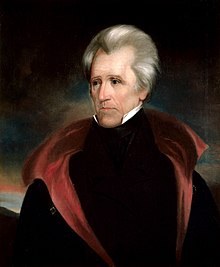President Andrew Jackson
| Andrew Jackson | |
|---|---|
 |
|
| 7th President of the United States | |
|
In office March 4, 1829 – March 4, 1837 |
|
| Vice President |
John C. Calhoun (1829–1832) None (1832–1833) Martin Van Buren (1833–1837) |
| Preceded by | John Quincy Adams |
| Succeeded by | Martin Van Buren |
|
United States Senator from Tennessee |
|
|
In office March 4, 1823 – October 14, 1825 |
|
| Preceded by | John Williams |
| Succeeded by | Hugh Lawson White |
|
In office September 26, 1797 – April 1, 1798 |
|
| Preceded by | William Cocke |
| Succeeded by | Daniel Smith |
| Military Governor of Florida | |
|
In office March 10, 1821 – December 31, 1821 |
|
| Appointed by | James Monroe |
| Preceded by | José María Coppinger (Spanish East Florida) |
| Succeeded by | William Pope Duval |
| Member of the U.S. House of Representatives from Tennessee's at-large district |
|
|
In office December 4, 1796 – September 26, 1797 |
|
| Preceded by | Constituency established |
| Succeeded by | William C. C. Claiborne |
| Personal details | |
| Born |
March 15, 1767 Waxhaw Settlement between the Provinces of North Carolina and South Carolina, British America |
| Died | June 8, 1845 (aged 78) Nashville, Tennessee, U.S |
| Resting place | The Hermitage |
| Nationality | American |
| Political party |
Democratic (after 1828) Democratic-Republican (Before 1828) |
| Spouse(s) | Rachel Donelson (m. 1794; d. 1828) |
| Children | 3 adopted sons |
| Signature | |
| Military service | |
| Allegiance |
|
| Service/branch |
|
| Rank |
|
| Unit |
|
| Battles/wars |
American Revolutionary War • Battle of Hobkirk's Hill Creek War • Battle of Talladega • Battles of Emuckfaw and Enotachopo Creek • Battle of Horseshoe Bend War of 1812 • Battle of Pensacola • Battle of New Orleans First Seminole War Conquest of Florida • Battle of Negro Fort • Siege of Fort Barrancas |
| Awards |
Congressional Gold Medal Thanks of Congress |
| The Jackson Cabinet | ||
|---|---|---|
| Office | Name | Term |
| President | Andrew Jackson | 1829–1837 |
| Vice President | John C. Calhoun | 1829–1832 |
| None | 1832–1833 | |
| Martin Van Buren | 1833–1837 | |
| Secretary of State | Martin Van Buren | 1829–1831 |
| Edward Livingston | 1831–1833 | |
| Louis McLane | 1833–1834 | |
| John Forsyth | 1834–1837 | |
| Secretary of Treasury | Samuel D. Ingham | 1829–1831 |
| Louis McLane | 1831–1833 | |
| William J. Duane | 1833 | |
| Roger B. Taney | 1833–1834 | |
| Levi Woodbury | 1834–1837 | |
| Secretary of War | John H. Eaton | 1829–1831 |
| Lewis Cass | 1831–1836 | |
| Attorney General | John M. Berrien | 1829–1831 |
| Roger B. Taney | 1831–1833 | |
| Benjamin Franklin Butler | 1833–1837 | |
| Postmaster General | William T. Barry | 1829–1835 |
| Amos Kendall | 1835–1837 | |
| Secretary of the Navy | John Branch | 1829–1831 |
| Levi Woodbury | 1831–1834 | |
| Mahlon Dickerson | 1834–1837 | |
Andrew Jackson (March 15, 1767 – June 8, 1845) was an American soldier and statesman who served as the seventh President of the United States from 1829 to 1837 and was the founder of the Democratic Party. Before being elected to the presidency, Jackson served in Congress and gained fame as a general in the United States Army. As president, Jackson sought to advance the rights of the "common man" against a "corrupt aristocracy", and also endeavored to preserve the Union.
He became a practicing lawyer in Tennessee and in 1791 he married Rachel Donelson Robards. Jackson served briefly in the U.S. House of Representatives and the U.S. Senate. Upon returning to Tennessee, he was appointed a justice on the Tennessee Supreme Court, serving from 1798 until 1804. In 1801, Jackson was appointed colonel in the Tennessee militia, and was elected its commander the following year. He led Tennessee militia and U.S. Army regulars during the Creek War of 1813–1814, winning a major victory at the Battle of Horseshoe Bend. The subsequent Treaty of Fort Jackson required the Creek surrender of vast lands in present-day Alabama and Georgia. Jackson won a decisive victory in the War of 1812 over the British army at the Battle of New Orleans, making him a national hero. Following the conclusion of the War of 1812, Jackson led U.S. forces in the First Seminole War, which helped produce the Adams–Onís Treaty of 1819 and the transfer of Florida from Spain to the United States. Following the ratification of the treaty, Jackson briefly served as Florida's first territorial governor before winning election as a U.S. Senator from Tennessee.
...
Wikipedia
